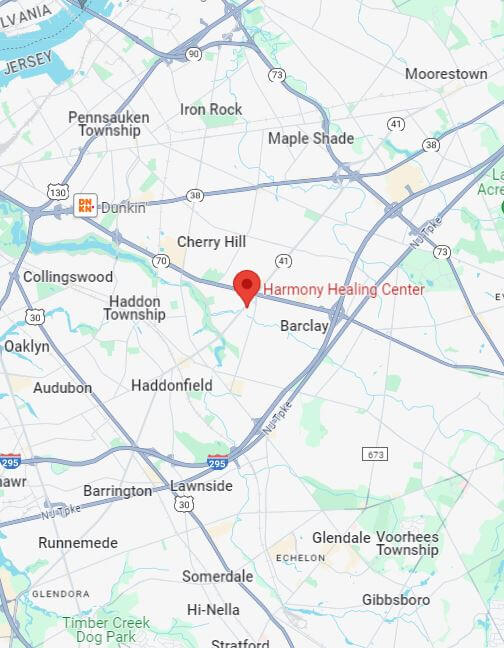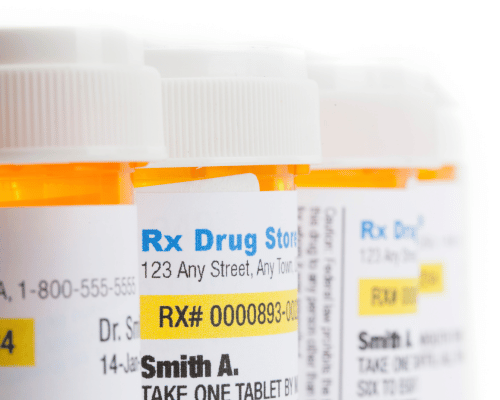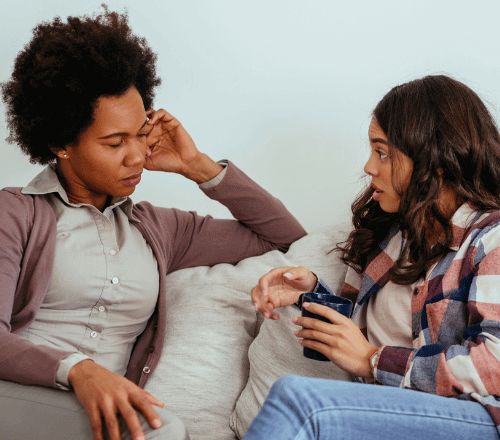Harmony Healing Substance Addiction Treatment Center in Cherry Hill, New Jersey, offers holistic treatment plans that treat the physical, emotional, and psychological symptoms of addiction. With evidence-based treatment therapies, counseling, and wellness activities, they help patients break free from addiction to even the most addictive prescription drug and embrace sobriety in a serene environment conducive to healing and growth.
For those struggling with prescription drug addiction, including opioid dependency, Harmony Healing offers specialized rehab programs designed to treat the diverse challenges associated with these substances. Their expert team of medical professionals and addiction specialists provides personalized care and support throughout every stage of the recovery journey. Through a combination of medication-assisted treatment, therapy sessions, detoxification protocols, and aftercare planning, Harmony Healing equips patients with the tools and resources needed to overcome addiction and reclaim their lives.
If you or someone you know is struggling with prescription medication abuse, take the first step toward healing by contacting Harmony Healing Substance Addiction Treatment Center to learn more about our comprehensive rehab treatment programs.
What Are Prescription Drugs?
Prescription drugs, available only with a doctor’s prescription, treat various medical conditions and undergo strict regulation for safety. Ranging from painkillers to antidepressants, they offer benefits but pose risks of misuse and addiction, notably opioids, benzodiazepines, and stimulants. Misuse can lead to severe consequences, emphasizing the importance of proper use under medical guidance.
Nonmedical use of prescription drugs involves taking them in a manner or dosage other than prescribed or for non-medical purposes. This can include taking someone else’s prescription, taking larger doses than prescribed, or crushing pills to snort or inject them. Misusing prescription drugs can lead to a range of negative consequences, including addiction, overdose, and even death. Therefore, individuals must use prescription medications only as directed by their doctor and be aware of the risks associated with these drugs.
What Is an Addiction Rehab Treatment Center?
An addiction rehab treatment center is a facility that aims to help patients recover from substance abuse and addiction with services like detoxification, counseling, and therapy. By helping treat the physical, psychological, and emotional aspects of prescription drug addiction, these centers provide a supportive environment for detox, skill-building, and long-term sobriety strategies.
Addiction rehab treatment centers often employ a team of professionals, including doctors, therapists, counselors, nurses, and support staff, to provide comprehensive care tailored to each person’s needs. These centers may offer residential and outpatient programs, allowing the patients to choose the level of care that best helps their circumstances. By providing a combination of evidence-based treatments and personalized support, addiction rehab treatment centers help patients recover from addiction and find lasting sobriety. If you suffer from prescription drug dependency, we can help. Contact us at Harmony Healing Alcohol and Drug Addiction Treatment Center.

How to Find Prescription Drug Rehab Near Me in New Jersey
Harmony Healing Center, located at 401 Kings Highway S, Cherry Hill, NJ 08034, offers comprehensive programs, including partial hospitalization (PHP), intensive outpatient (IOP), medication-assisted treatment (MAT), and general outpatient services. We accept new patients in our addiction treatment programs for men and women and provide housing options. If you struggle with prescription drug addiction, contact us today to begin your treatment journey.
To find prescription drug rehab facilities in New Jersey, follow these steps:
Steps to find a rehab facility
Harmony Health Center – Cherry Hill, New Jersey
401 Kings Highway South
Building #1 Tara Corporate Park
Cherry Hill, NJ 08034
Types of Addictive Prescription Drugs
Addictive prescription drugs, including opioids, benzodiazepines, stimulants, and sedatives, each present distinct risks of dependency and misuse. Understanding these classes is vital for informed medication management and seeking timely intervention if addiction arises, ensuring individuals can navigate their healthcare safely and effectively.
Understanding the different types of addictive prescription drugs is important for recognizing the risks associated with their use and seeking appropriate treatment if addiction develops. In the following sections, we’ll delve deeper into each class of addictive prescription drugs, exploring their effects, risks, and treatment options. By gaining insight into these medications, patients can make decisions about their health and seek help if needed to overcome addiction and regain control of their lives. If you or someone you know is suffering from a prescription drug addiction, contact us at Harmony Healing Addiction Treatment Center in New Jersey. We offer addiction treatment services for people in New Jersey and the tristate area.
Opioids: Oxycodone (OxyContin), Hydrocodone (Vicodin)
Benzodiazepines: Alprazolam (Xanax), Diazepam (Valium), and Lorazepam (Ativan)
Stimulants: Adderall and Ritalin
Sleep Medications: Zolpidem (Ambien), Eszopiclone (Lunesta), and Zaleplon (Sonata)
Muscle Relaxants: Carisoprodol (Soma) and Cyclobenzaprine (Flexeril)

Contact Us for a Free Assessment
Are you ready to turn the page and begin a new chapter in your story? We have the tools you need to transform your life. Let’s talk about what’s next.

How Much Does Addiction Treatment for Prescription Drug Abuse Cost?
Addiction treatment for prescription drug abuse costs vary based on factors like program type, duration, level of care, and facility location. Outpatient programs are generally cheaper, involving therapy sessions and support groups, ranging from hundreds to thousands of dollars monthly. Residential programs offering round-the-clock care can cost several thousand to tens of thousands monthly.
Insurance coverage can significantly impact the out-of-pocket costs for addiction treatment. Many insurance plans will typically cover at least a portion of addiction treatment services, including medication-assisted therapy (MAT), individual addiction counseling, group therapy, and detox. Medicaid and Medicare also offer coverage for addiction treatment services for eligible individuals. Additionally, some addiction treatment centers offer sliding-scale fees or financial assistance programs to help make care more affordable for those in need. Overall, individuals seeking addiction treatment for prescription drug abuse should explore their options carefully and inquire about payment plans, insurance coverage, and financial assistance programs to find a program that meets their needs and budget.
To learn more about the cost of prescription drug addiction treatment at Harmony Healing, contact us at (888) 409-5356. Our admissions team is here to help you verify your insurance coverage options for treatment and discuss payment plans and other forms of financial assistance as needed.
Does Insurance Cover Prescription Drug Addiction Rehab?
Insurance plans typically cover prescription drug addiction rehab as part of their behavioral health benefits, encompassing detoxification, therapy, medication-assisted treatment, and aftercare. However, coverage specifics vary widely, necessitating individuals to review policy details or contact their provider for clarification on included services and potential out-of-pocket costs.
Additionally, certain government-funded insurance programs, such as Medicaid and Medicare, provide coverage for prescription drug addiction rehab for eligible individuals. These programs may cover a range of services, including detoxification, counseling, medication management, and recovery support services. Individuals seeking addiction treatment should inquire about their insurance coverage and explore their available options to ensure they receive proper care while minimizing out-of-pocket expenses. Contact us at Harmony Healing Center to learn more about our addiction treatment program, or fill out an insurance verification form online to see what your insurance plan covers for prescription drug addiction rehab.
Can Anyone Become Addicted to Prescription Drugs?
While not universal, anyone, irrespective of age, gender, or background, can develop an addiction to prescription drugs due to various factors like genetics, substance abuse history, mental health conditions, and prolonged or improper usage. Misuse, particularly of opioids or benzodiazepines, and recreational use also heighten addiction risks.
To encourage prescription drug misuse prevention, it’s essential to recognize the potential risks associated with prescription drugs and to use them only as directed by a healthcare professional. Regular communication with healthcare providers, following the use of the medication in prescribed dosages, and proper medication management can help with prescription medication safety and help prevent prescription drug overdose. Additionally, seeking timely intervention if experiencing signs of dependency or addiction, such as cravings, tolerance, withdrawal symptoms, or impaired functioning, is crucial for addressing the issue and initiating recovery.
Overall, while addiction to prescription drugs can affect anyone, awareness of risk factors and proactive measures can help prevent or manage addiction effectively. If you or someone you know is struggling with prescription drug dependency, call Harmony Healing’s dedicated rehab staff at (888) 409-5356 to learn more about holistic treatment options.
Signs and Symptoms of Prescription Drug Addiction
Signs of prescription drug addiction encompass tolerance, withdrawal symptoms, changes in behavior like secrecy or neglect of responsibilities, and physical symptoms such as altered sleep patterns or weight changes. Psychological indicators may include mood swings, irritability, anxiety, or depression, warranting early intervention and appropriate treatment.
People struggling with prescription drug addiction often experience financial difficulties due to spending money on obtaining the drug, and they may have strained relationships with family and friends as a result of their substance use. Recognizing these signs is important for early intervention and seeking appropriate treatment. In the following sections, we’ll delve deeper into specific signs and symptoms associated with addiction to opioids, benzodiazepines, stimulants, and other prescription drugs, providing insight into the complexities of this condition and guiding individuals toward the help they need.

Increased Tolerance and Withdrawal Symptoms
Preoccupation and Loss of Control
Continued Use Despite Harm
Social Isolation and Changes in Behavior
Doctor Shopping and Using for Nonmedical Purposes
Physical Symptoms and Neglecting Responsibilities
Financial Problems and Engaging in Deceptive Practices
How to Help Someone With a Prescription Drug Addiction
Supporting someone with a prescription drug addiction includes initiating compassionate conversations, urging professional help, and providing continuous support. Educating yourself about addiction and treatment options is crucial, as is offering practical aid like finding treatment facilities or attending appointments together. Emotional support and patience are vital throughout the recovery journey.
Set boundaries to protect yourself and your relationship with the individual. This may involve refusing to enable their drug use, such as refusing to provide money or cover up their behavior. Encourage healthy habits and activities that promote well-being, such as exercise, hobbies, and socializing with sober friends. Remember that recovery is a process, and relapses may occur. Offer ongoing encouragement and support, emphasizing that you believe in their ability to overcome their addiction. In the following sections, we’ll explore specific strategies and resources for supporting someone with a prescription drug addiction, empowering you to be an effective ally in their recovery journey. If someone you care for needs help to overcome a prescription drug addiction, contact us at Harmony Healing Drug and Alcohol Addiction Treatment Center to inquire about our addiction treatment options.
Educate Yourself and Express Concern
Encourage Treatment and Provide Practical Support
Listen Actively and Provide Emotional Support
Set Boundaries and Avoid Enabling Behaviors
Encourage Healthy Coping Strategies
Seek Support for Yourself
Contact Harmony Healing Center

Prescription Drug Addiction Statistics in New Jersey
Contact Harmony Healing Center
Get personalized help from an empathetic professional.
